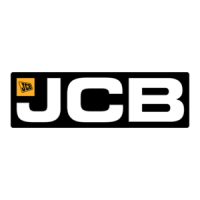Operation
Operating Safety
22 9821/6100-4 22
Controls
You or others can be killed or seriously injured if you operate the control levers from outside the machine.
Operate the control levers only when you are correctly seated.
Passengers
Passengers in or on the machine can cause accidents. Do not carry passengers.
Fires
If your machine is equipped with a fire extinguisher, make sure it is checked regularly. Keep it in the correct
machine location until you need to use it.
Do not use water to put out a machine fire, you could spread an oil fire or get a shock from an electrical fire.
Use carbon dioxide, dry chemical or foam extinguishers. Contact your nearest fire department as quickly as
possible. Firefighters must use self-contained breathing apparatus.
Roll Over Protection
If the machine starts to roll over, you can be crushed if you try to leave the cab. If the machine starts to roll
over, do not try and jump from the cab. Stay in the cab, with your seat belt fastened.
Confined Areas
Pay extra attention to proximity hazards when operating in confined areas. Proximity hazards include buildings,
traffic and bystanders.
Safe Working Loads
Overloading the machine can damage it and make it unstable. Study the specifications in the Operator's Manual
before using the machine.
Lightning
If you are inside the machine during a lightning storm stay in the machine until the storm has passed. If you
are outside of the machine during a lightning storm stay away from the machine until the storm has passed.
Do not attempt to mount or enter the machine.
If the machine is struck by lightning do not use the machine until it has been checked for damage and
malfunction by trained personnel.
Worksite Safety
WARNING You or others can be killed or seriously injured if you do unfamiliar operations without first
practising them. Practise away from the worksite on a clear area. Keep other people away. Do not perform
new operations until you are sure you can do them safely.
WARNING There could be dangerous materials such as asbestos, poisonous chemicals or other harmful
substances buried on the site. If you uncover any containers or you see any signs of toxic waste, stop the
machine and advise the site manager immediately.
WARNING Before you start using the machine, check with your local gas company if there are any buried
gas pipes on the site.
If there are buried gas pipes we recommend that you ask the gas company for any specific advice regarding
the way you must work on the site.
Some modern gas pipes cannot be detected by metal detectors, so it is essential that an accurate map of
buried gas pipes is obtained before any excavation work commences.
Hand dig trial holes to obtain precise pipe locations. Any cast iron pipes found must be assumed to be gas
pipes until contrary evidence is obtained.
Older gas pipes can be damaged by heavy vehicles driving over the ground above them.
Leaking gas is highly explosive.
If a gas leak is suspected, contact the local gas company immediately and warn all personnel on the site.
Ban smoking, make sure that all naked lights are extinguished and switch off any engines which may be
running.
You are strongly advised to make sure that the safety arrangements on site comply with the local laws and
regulations concerning work near buried gas pipes.

